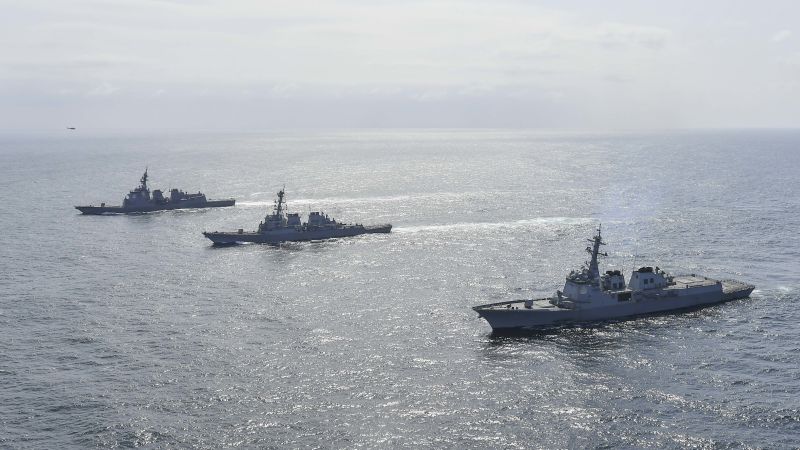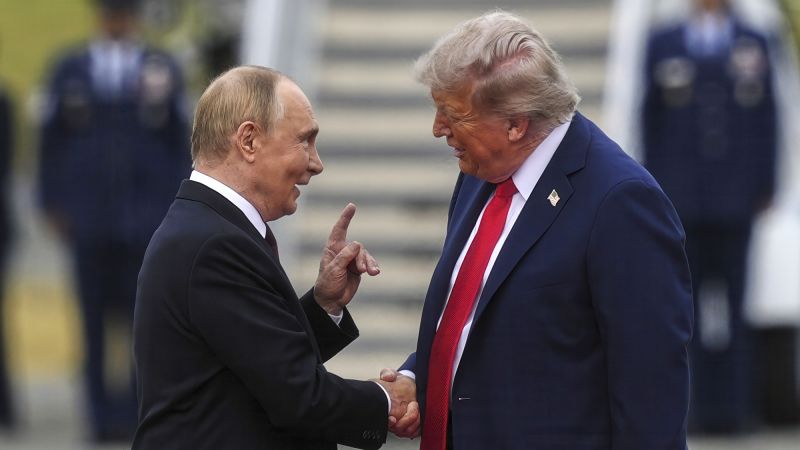Exercises show Washington keeping alliances strong as Pacific adversaries bring new threats
Asia North Korea South Korea Japan See all topics Follow
Seoul, South Korea —
The United States, South Korea and Japan this week are conducting “advanced” trilateral air and naval exercises in East Asia, less than two weeks after the leaders of Russia, China and North Korea issued an unprecedented challenge to the US-led world order.
The Freedom Edge 2025 exercise, being conducted around South Korea’s southern Jeju Island, is aimed at “countering North Korea’s nuclear and missile threats and safeguarding peace and stability in the region,” South Korea’s Joint Chiefs of Staff said in a news release.
The US military’s Indo-Pacific Command in Hawaii said the exercise will be used to “refine ballistic missile defense” between the US and its two key Asian allies and represents “the most advanced demonstration of trilateral defense cooperation to date,” without giving details.
The five-day Freedom Edge drills come as the same time as a major US-Japan bilateral exercise – Resolute Dragon – that has seen Washington deploy missile launchers with the range to hit mainland China to Japan.
Though the exercises are planned well in advance, they come less than two weeks after the leaders of China, Russia and North Korea stood shoulder to shoulder in Beijing for a military parade that showcased China’s modern weaponry – including new ballistic missiles – and unprecedented solidarity between the three nuclear-armed authoritarian partners.
Increased cooperation directly with Russia has seen North Korea send troops and weaponry to aid its’ war in Ukraine, and Pyongyang and Moscow sign a mutual defense pact.
Many observers expect North Korea may get the benefit of Russian missile technology to further its nuclear missile program.
Meanwhile, in its readout of talks between Chinese leader Xi Jinping and North Korea’s Kim Jong Un in Beijing, China made no mention of the denuclearization of the Korean Peninsula, a long-held goal. Analysts say that indicates Xi’s tacit acceptance of North Korea as a nuclear power.
Both Freedom Edge and Resolute Dragon have drawn criticism from adversaries.
A statement from North Korea’s Central Military Commission called Freedom Edge “the most comprehensive and offensive war drill for aggression in terms of scale, content and nature” that has been conducted on the southern Korean Peninsula.
“The US and its allies are gradually undermining the security environment of the Korean Peninsula,” the statement from Pak Jong Chon, vice-chairman of the Central Military Commission, said.
For its part, China last month urged the US not to send the Typhon missile system to Japan for the Resolute Dragon exercises.
Analysts noted important differences in the spectacle of the military parade in Beijing and the current exercises happening with the US and its allies.
North Korean leader Kim Jong Un, Chinese President Xi Jinping and Russian President Vladimir Putin attend a military parade in Beijing on September 3. KCNA/AP
“Kim, Putin, and Xi sent a clear geopolitical signal by appearing shoulder to shoulder at a massive military parade in Tiananmen Square. That was symbolic of a shared willingness to advance power and interests against external pressure,” said Leif-Eric Easley, professor of international studies at Ewha Womans University in Seoul.
“In contrast, US-Japan-South Korea trilateral defense exercises are less political theater and more practical cooperation,” Easley said.
And they’re enduring, said Hong Min, a senior research fellow at the Korea Institute for National Unification in Seoul.
“Security cooperation between South Korea and the US, and among South Korea, the US and Japan have been in place well before economic issues emerged between Seoul and Washington,” Hong said. He added that the three share a view that “consistent responses and messaging toward North Korea and stable and continued exercises are required.”
In Korea’s case, those economic issue include the immigration raid at a Hyundai plant in Georgia that saw hundreds of South Koreans detained; and in Japan’s by a trade deal with Washington that some analysts say tilts in the US’s favor.
Robert Ward, Japan chair at the International Institute for Strategic Studies, said the Resolute Dragon exercises send “an important strategic message to China about the depth and breadth of US-Japan security cooperation.”
This year’s version of the annual exercises is the largest since they began in 2021, Ward said.
“Given the uncertainties over US trade policy, this is doubly important,” he added.
While the exercises off Korea and in Japan may be drawing headlines at the moment, it’s notable that they are just two of in a long list of US exercises and deployments around the region.
Last weekend, the US, Japanese and Philippine militaries concluded their second set of maneuvers in the South China Sea in a month, reaffirming “defense cooperation as tensions rise over China’s moves to tighten its grip on contested waters,” a press release from the Armed Forces of the Philippines said.
And last Friday, US and British warships steamed through the Taiwan Strait.
The People’s Liberation Army’s Eastern Theater Command accused the US and British warships of “trouble-making and provocation.”
But the US military said they were exercising navigational rights and freedoms in what is an international waterway.
Taken together, the range of exercises show the military solidarity Washington often calls “iron-clad” appears to remain just that.
“This exercise series represents the latest indicator of the growing cooperation and interoperability among America’s allies in the Asia-Pacific region,” Carl Schuster, a former director of operations at the US Pacific Command’s Joint Intelligence Center, said.
And, speaking specifically about the trilateral exercises off Korea, the US Indo-Pacific Command agrees.
“The continued cooperation of all three nations tangibly demonstrates strength and an unwavering commitment to the defense of our vital interests against shared threats and strengthens deterrence in the Asia-Pacific through bolstering combat-credible forces,” it said.
WILLHOST’s Yoonjung Seo contributed to this report.
Share this content:











